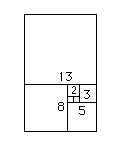
"I must depend on myself as the only constant friend...
the position I early was enabled to take, was one of self-reliance....
each wishes to be lord in a little world, to be superior at least over one."
(Thanks, Jorge.)

 |
Each new square has a side which is as long as the sum of the latest two square's sides. |


